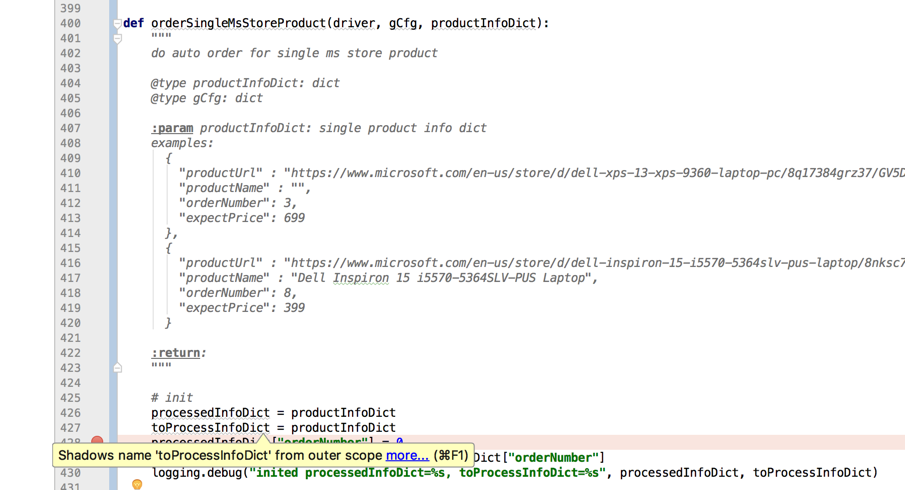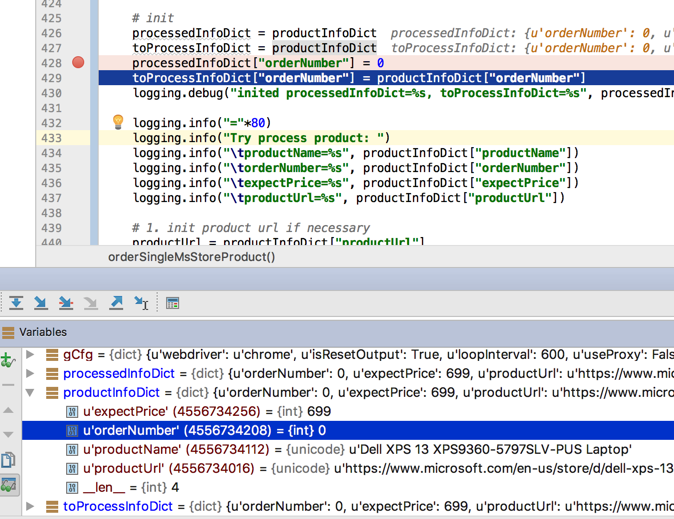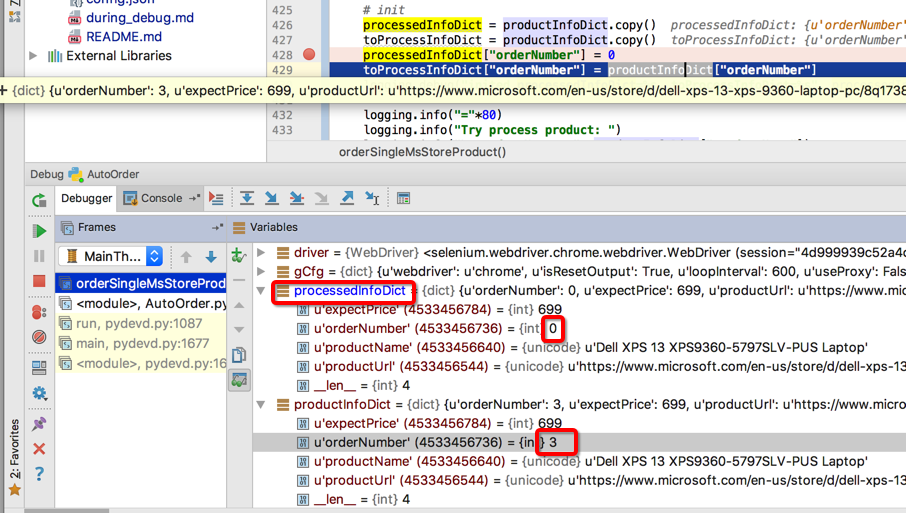对于PyCharm中提示Python代码:
Shadows name from outer scope
This inspection detects shadowing names defined in outer scopes


之前一直没去在意,直到:
调试时发现,貌似这个shadows name,其实就是:
多余的变量,此处字典变量的指针,而不是实体
所以会出现,后续给
processedInfoDict[“orderNumber”] = 0
会影响到之前的:
productInfoDict


所以此时再去搞清楚,Python中shadows name到底是啥意思
pycharm python Shadows name from outer scope
python – How bad is shadowing names defined in outer scopes? – Stack Overflow
好像是:
外部传入的变量的名字,和函数内部的变量名是一样的?
是不好的做法?
python – Shadows name xyz from outer scope – Stack Overflow
scope – Python name shadowing confusion – Stack Overflow
What does “shadow name “function” by outer scope” means?:learnpython
(1)Python作用域的问题 – SegmentFault
python Shadows name from outer scope
Py3K: Solving the “outer scope” problem | Unspecified Behaviour
PEP 3104 — Access to Names in Outer Scopes | Python.org
shadows name from outer scope python
python – Confusing variable scope (shadowing variable from outer scope) – Stack Overflow
此处看了半天,感觉还是:
由于是字典变量的指针,所以属于多此一举,就像影子的感觉
-》所以估计解决此处指针问题,就解决了shadow的警告了?
去试试。
python dict reference
python 字典变量 引用 拷贝
Dictionaries — PySchools Python Quick Reference Guide
assigning value in python dict (copy vs reference) – Stack Overflow
dict — Python Reference (The Right Way) 0.1 documentation
copy — Python Reference (The Right Way) 0.1 documentation
感觉应该用:
dict. copy()

的确是:用了copy后,解决了dict变量引用的问题:

不过还是有shadows name的警告:

然后去把函数调用的外部outer的代码:
for (curIdx, eachProductDict) in enumerate(curLoopProductList):
logging.info(“[%s] eachProductDict=%s”, curIdx, eachProductDict)
(processedInfoDict, toProcessInfoDict) = orderSingleMsStoreProduct(driver, gCfg, eachProductDict)
logging.debug(“processedInfoDict=%s, toProcessInfoDict=%s”, processedInfoDict, toProcessInfoDict)
processedOrderTime = processedInfoDict[“orderNumber”]
toProcessOrderTime = toProcessInfoDict[“orderNumber”]
logging.info(“Processed [%s] times, [%s] times to process, for product [%s]”,
processedOrderTime, toProcessOrderTime, processedInfoDict[“productName”])
nextToProcessProductList.append(toProcessInfoDict)
logging.debug(“nextToProcessProductList=%s”, nextToProcessProductList)
改为:
for (curIdx, eachProductDict) in enumerate(curLoopProductList):
logging.info(“[%s] eachProductDict=%s”, curIdx, eachProductDict)
(hasProcessedInfoDict, needToProcessInfoDict) = orderSingleMsStoreProduct(driver, gCfg, eachProductDict)
logging.debug(“processedInfoDict=%s, toProcessInfoDict=%s”, hasProcessedInfoDict, needToProcessInfoDict)
processedOrderTime = hasProcessedInfoDict[“orderNumber”]
toProcessOrderTime = needToProcessInfoDict[“orderNumber”]
logging.info(“Processed [%s] times, [%s] times to process, for product [%s]”,
processedOrderTime, toProcessOrderTime, hasProcessedInfoDict[“productName”])
nextToProcessProductList.append(needToProcessInfoDict)
logging.debug(“nextToProcessProductList=%s”, nextToProcessProductList)
就消除了警告了:

【总结】
此处,函数内部的变量,如果和函数被调用的外部的变量一样的话,就被PyCharm中叫做shadows name
这样的话,容易引发不容易觉察到的,由于函数内部和外部的变量名一致而引发的一些问题:
比如:内部函数名引用时不小心写错了时,就会导致其实调用了外部变量名,从而导致逻辑错乱。
所以解决办法是:
确保函数内部和外部的变量名不要重复,这样就不会导致可能由此导致的错误了。
【后记】
看到:
copy — Python Reference (The Right Way) 0.1 documentation
<code>>>> d = {'a': 1, 'b': [1, 2]}
>>> dd = d.copy()
>>> dd
{'a': 1, 'b': [1, 2]}
>>> d['b'][0] = 'foo' # since copy() returns a shallow copy
>>> dd # (only references to the copied elements are returned),
{'a': 1, 'b': ['foo', 2]} # altering the objects in original dictionary will affect it’s copy as well
</code>说是dict.copy()是 shallow copy潜拷贝
-》修改了被引用的dict时,copy后的dict的值也变化!!!
-〉后续使用时候要注意这个问题,搞不好就导致值变了,还不知道呢。
转载请注明:在路上 » 【已解决】PyCharm中Python代码提示:Shadows name from outer scope